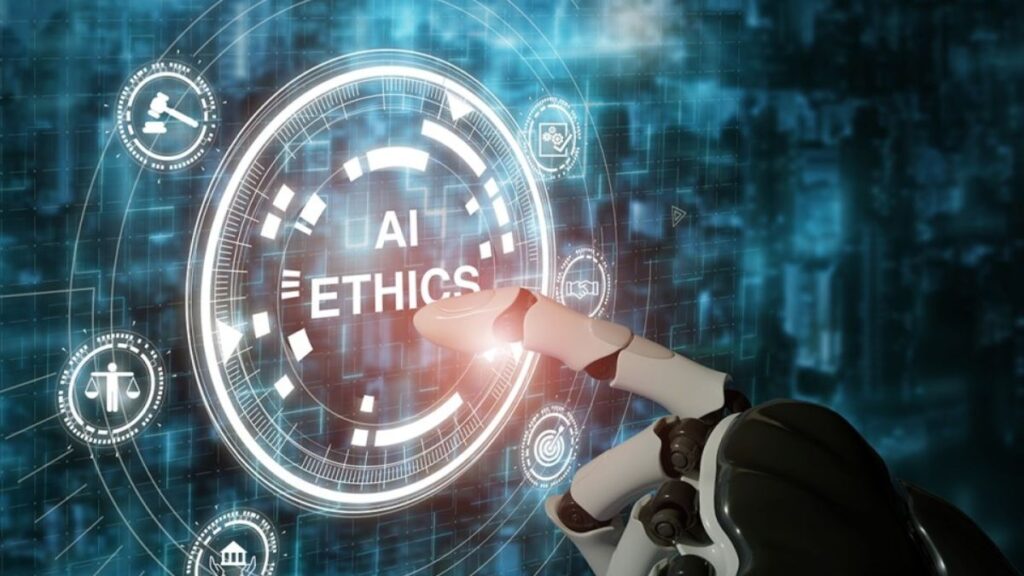Artificial Intelligence (AI) has been one of the most transformative technological advancements of the 21st century. From self-driving cars to personalized recommendations on streaming platforms, AI has permeated nearly every aspect of our daily lives. However, as the capabilities of AI continue to grow, so too does the importance of understanding its ethical implications. The ethical concerns surrounding AI span a wide range of topics, including its impact on jobs, privacy, bias, accountability, and decision-making. In this article, we will explore the various ethical challenges that arise with the development and deployment of AI, and how society can address them responsibly.
The Role of AI in Society
Artificial Intelligence refers to systems or machines that can perform tasks that typically require human intelligence. These tasks include problem-solving, language understanding, visual perception, and decision-making. AI can be classified into two main types: narrow AI, which is designed to perform specific tasks (like image recognition or natural language processing), and general AI, which aims to mimic human-like cognitive abilities across a wide range of tasks.
AI has the potential to bring about significant benefits for society. In fields such as healthcare, education, transportation, and finance, AI can enhance productivity, reduce human error, and provide innovative solutions to longstanding challenges. For example, AI-powered diagnostic tools can assist doctors in detecting diseases more accurately, while AI in transportation can improve traffic flow and reduce accidents. However, as AI becomes more embedded in critical aspects of our lives, it also raises important ethical concerns that must be addressed.
Privacy and Data Security Concerns
One of the most significant ethical issues surrounding AI is privacy. AI systems often rely on large amounts of data to function effectively, including personal data about individuals’ behaviors, preferences, and even physical characteristics. This raises questions about who owns this data, how it is collected, and how it is used.
For instance, AI-driven platforms like social media networks and online retailers gather vast amounts of data from users. While this data is used to enhance user experiences, there is a risk that it could be misused or fall into the wrong hands. Privacy concerns intensify when AI systems are used in surveillance technologies, such as facial recognition, which can track individuals without their consent. The lack of transparency in how data is collected and used can further exacerbate the issue, leaving people vulnerable to exploitation or manipulation.
The ethical dilemma here revolves around finding a balance between leveraging AI for innovation and protecting individuals’ privacy rights. Governments and organizations must establish robust frameworks for data protection and ensure that AI systems are transparent, accountable, and compliant with privacy regulations.
The Challenge of AI Bias and Fairness
Another pressing ethical issue is the potential for bias in AI systems. AI algorithms are typically trained on historical data, which means that if the data reflects biases present in society, those biases can be embedded into the AI system. For example, if an AI system is trained using data from a workforce that is predominantly male, the system may unintentionally favor male candidates when making hiring decisions, leading to gender discrimination.
Similarly, biased data can also result in racial, ethnic, and socioeconomic biases in AI systems. For instance, predictive policing algorithms, which are used to forecast crime hotspots or identify potential criminals, have been found to disproportionately target minority communities. These biases can perpetuate inequality and undermine public trust in AI technologies.
To address AI bias, developers must ensure that the data used to train AI systems is representative of diverse populations. They must also employ fairness algorithms that actively seek to identify and mitigate biases. Ethical AI development requires continuous monitoring, auditing, and updating of AI systems to ensure that they remain fair and unbiased.
Accountability and Transparency in AI Decision-Making
As AI systems become increasingly autonomous, the question of accountability becomes more complex. In many cases, AI is used to make important decisions that affect people’s lives, such as in healthcare diagnoses, loan approvals, or criminal sentencing. When an AI system makes a decision, it may be difficult to trace the exact reasoning behind it, leading to a lack of transparency.
This lack of transparency, often referred to as the “black box” problem, poses a significant ethical challenge. If an AI system makes a decision that negatively impacts an individual, such as denying them a loan or misdiagnosing their health condition, it can be difficult for the affected person to understand why that decision was made or challenge it.
To address these concerns, AI systems must be designed to provide clear explanations for their decisions. This requires developing explainable AI (XAI), which focuses on making AI decision-making processes more transparent and understandable. By ensuring accountability and transparency, developers can increase public trust in AI systems and reduce the risks associated with automated decision-making.
The Impact of AI on Employment and the Workforce
The rise of AI has led to concerns about its impact on jobs and the future of work. AI systems have the potential to automate a wide range of tasks that were previously performed by humans, from driving trucks to answering customer service inquiries. While this can lead to increased efficiency and lower costs for businesses, it also raises questions about job displacement and economic inequality.
Some industries are already experiencing the effects of AI automation. For example, autonomous vehicles threaten to displace millions of truck drivers, while AI-driven chatbots and virtual assistants are replacing human workers in customer service roles. The automation of routine tasks could also lead to a reduction in entry-level jobs, making it more difficult for people to enter the workforce.
While AI can create new opportunities in fields like AI development, data science, and robotics, it is crucial for policymakers to consider how to mitigate the negative effects of automation. This includes investing in education and retraining programs, providing social safety nets, and creating policies that encourage the responsible deployment of AI technologies. The ethical responsibility lies in ensuring that AI benefits society as a whole, rather than exacerbating existing inequalities.
The Ethics of Autonomous AI Systems
As AI systems become more autonomous, they are increasingly making decisions without human intervention. This raises ethical questions about how these systems should behave in complex, real-world situations. For example, autonomous vehicles must make decisions in situations where human life is at stake, such as deciding how to avoid a collision or choosing between the lesser of two harms.
The ethical dilemma in these scenarios is often framed as the “trolley problem,” a thought experiment in which an individual must choose between sacrificing one life to save many others. How should an autonomous vehicle be programmed to make these kinds of decisions? Should it prioritize saving the life of its passenger, the pedestrians on the street, or others involved in the situation?
The ethics of autonomous AI systems involve complex moral considerations, and there is no simple answer to these questions. As AI continues to evolve, it is essential for ethicists, engineers, and policymakers to work together to establish ethical guidelines for the development and deployment of autonomous AI systems. These guidelines should prioritize human well-being, safety, and fairness.
The Future of AI Ethics
As AI technologies continue to evolve, it is clear that ethical considerations will play a critical role in shaping their future. In order to ensure that AI is developed and deployed responsibly, several key actions must be taken:
- Collaborative Efforts: Governments, businesses, and academic institutions must work together to create ethical standards and regulations for AI. Collaboration across different sectors can help ensure that AI is used in ways that align with societal values and respect human rights.
- Public Engagement: Public discussions about AI ethics should be encouraged, as these conversations help raise awareness and promote transparency. It is essential that the public has a voice in shaping the ethical framework for AI, as the consequences of AI decisions can affect everyone.
- Education and Awareness: AI literacy is becoming increasingly important for individuals and organizations. By educating people about AI, its potential benefits, and its ethical risks, we can help ensure that AI is used responsibly and in a way that benefits society.
- Ethical AI Development: AI developers must prioritize ethics throughout the lifecycle of AI systems. This includes ensuring that AI systems are designed to be fair, transparent, and accountable, and that they do not cause harm to individuals or society.
Conclusion
The ethical challenges of Artificial Intelligence are vast and complex, but they are not insurmountable. As AI continues to evolve and become more integrated into our lives, it is essential that we approach its development with a strong sense of responsibility. By addressing issues like privacy, bias, accountability, and job displacement, we can help ensure that AI serves humanity in a way that promotes fairness, equity, and well-being for all. Ultimately, the future of AI depends on how we navigate these ethical considerations, and our ability to develop AI technologies that align with our values and aspirations as a society.



